A sample text widget
Etiam pulvinar consectetur dolor sed malesuada. Ut convallis
euismod dolor nec pretium. Nunc ut tristique massa.
Nam sodales mi vitae dolor ullamcorper et vulputate enim accumsan.
Morbi orci magna, tincidunt vitae molestie nec, molestie at mi. Nulla nulla lorem,
suscipit in posuere in, interdum non magna.
|
Sometimes I get sucked in to thinking that success comes quickly, could be reflected in a facebook timeline or described in 140 characters, or is “easy”. But then the other day I happened upon a cyclist on Strava, the excellent ride- and stat-tracking site that I use to track exactly how infrequently I actually get out and ride. Currently I have averaged 0 rides per week in 2012, thanks to integer rounding. Anyway, this rider is a top-tier professional who already won one international tour in 2012, and who also happens to live about 30 miles from me, so we actually ride some of the same roads. He’s using Strava under a pseudonym, but I’m positive that it’s him, not only because he’s the King of the Mountains on nearly every climb within 50 miles, but because this person’s feed showed every stage of the aforementioned international tour on all the right dates. (I’m not going to mention his name on the hope that it will somehow protect his privacy, which means he’ll let normal people like us continue to follow him on Strava.)
So now, having access to his day-to-day training, I’ve been reminded about the truth about success: it doesn’t come unless you do the work. Here’s his last week:
Sunday: 68 miles, 6,595 feet of climbing
Monday: 72 miles, 7,183 feet of climbing
Tuesday: 46 miles, 4,578 feet of climbing
Wednesday: 93 miles, 7,446 feet of climbing
Thursday: 38 miles, 1,370 feet of climbing
Friday: 62 miles, 1,923 feet of climbing
Saturday: 79 miles, 7,711 feet of climbing
Sunday: 122 miles, 9,554 feet of climbing
I’m not sure why the fact that a professional cyclist rides every day surprised me, but I guess I wasn’t really thinking about what his real life would look like. I only see him on TV at various races in exotic locations, and it’s easy to imagine that the team does most of the work, or that the races are the hard work and the rest of the time is for partying, or that his life is somehow easier because he probably has plenty of money in the bank. But really, the truth is, his success would not exist if he didn’t ride every single day, if he didn’t love what he was doing, and (I’m imagining this part) if he didn’t constantly look for ways to keep the work interesting.
Thankfully, I did not have a reading list for 2011, because there’s no doubt I would have failed to even come close to completing it. However, I did get through a few books this year, most of which were worth reading, and a few of which could be considered life-changing. They are (with minor spoilers):
Zeitoun (Dave Eggers) – Powerful, gripping story from the aftermath of Hurricane Katrina that takes a few unexpected turns. Unless you’ve been subjected to indefinite detainment recently, it may leave you in a bit of shock and awe over the issue. An especially relevant read in today’s easily terrorized world. 5 stars.
A Sideways Look At Time (Jay Griffiths) – Interesting, somewhat challenging read, simply because the author doesn’t accept most of the assumptions that underlie modern society. The necessity to constantly be more efficient, the importance of clock-time, and the limiting, controlling unity that results are challenged head-on with diverse examples of other, more relationship-driven cycles and rhythms found in indigenous cultures around the world. No matter whether you end up agreeing or disagreeing, this book will definitely make you think twice about your worldview and your priorities. 4 stars.
Forests (Robert Pogue Harrison) – A heavy read, spanning centuries of history, literature, and poetry, but written by a genius. Explores how forests, and the reality/idea of wilderness has grounded most of our cultural and religious landmarks in western society. 3.5 stars.
Slaughterhouse Five (Kurt Vonnegut) – This is the only Vonnegut I’ve read so far, so of course it is the best. His writing style is lucid and understandable, but the level of tragedy present near the end of WWII in Europe is almost impossible to comprehend. Definitely a must-read. 4 stars.
Roads to Quoz (William Least Heat-Moon) – I love the spirit of adventure that William Least Heat-Moon lives, but in his writing of this book it leads to, well, too much writing. Roads to Quoz is not as clear & focused as the epic, and more famous “Blue Highways”, and it’s a little like hanging out with someone who just keeps telling story after story to avoid dead air. That said, I don’t regret reading the book, and give it a solid 3 stars.
The Circumference of Home (Kurt Hoelting) – Quick read in the style of the adventure-epic, where one man decides to avoid traveling anywhere outside a 100km radius from his home on Whidbey Island, and avoid using fossil fuels to get around inside the . The arbitrariness of the 100km rule goes without saying, but this constraint does push him to some true adventures, including walking dozens of miles along rivers and the Sound between Seattle and Everett, biking all over the place, and kayaking across the Salish Sea to Vancouver Island with a group of Native Americans who have been canoeing across for centuries. Does prove that an independently wealthy person can live an extremely low-carbon lifestyle, but doesn’t exactly offer solutions for the masses. Definitely 4 stars, at least for this native Washingtonian, just for the descriptions of human-powered travel all over the Sound.
The Imperfectionists (Tom Rachman) – This book appears to be pretty popular, but I couldn’t get into it. And once I finally did get into it, I didn’t want to stay in it. Perhaps I’m too idealistic, but the themes of the slow decline of aging, family and business struggles and failures, and relationship missteps aren’t really high on my list of things to read about, given their relative abundance in real life. This book might be just right for some, but it wasn’t for me. 2 stars.
Bicycle Diaries (David Byrne) – This is the kind of book I’d love to write, because the author (David Byrne, of Talking Heads) just shared his experiences traveling the globe and biking in his free time. Along the way you find out which cities have the best bicycle infrastructure (hint: think northern europe), and how to get people to build bike racks for free (hint: offer to take them off the sidewalk in NYC after a year and sell them as artwork). 3.5 stars, or more if you love cycling.
Jesus, Interrupted (Bart D. Ehrman) – I’m going to totally spoil this book by revealing the two main points: 1) people who believe that every word of the Bible was written by God would have a significant crisis of faith if it were discovered that humans wrote the Bible, and 2) humans wrote the Bible. I found the book to be plodding at times, but it is very thorough and heartfelt, and definitely recommended if you spend much time thinking about #’s 1 and 2 above. 3 stars.
The Way We’re Working Isn’t Working (Tony Schwartz) – This book was a lifechanger for me, because I spend an inordinate amount of my time working, and I was struggling to feel that my time was well-spent. It gave me (and many others, no doubt) lots of tools to deal with this struggle, and ways to transform the happiness and fulfillment of a career by recognizing the many pitfalls in the modern workplace and, hopefully, avoiding them. My full review is here, and I give this one 5 stars (maybe less if you don’t work in an office and/or already love your job).
Manly Hero (Adrastus Rood) – My favorite book of the year, and the one I read the fastest. This fantasy is more accessible (and shorter!) than the books of J.R.R. Tolkein or G.R.R. Martin, but is really wide-ranging in its exploration of human ideals through the lens of an adventure quest. And its funny, too, both in plot twists and in wordplay. My Amazon review is here, and I give this must-read 5 stars.
So that was 2011, and I’m hoping to read more in 2012, with a goal of finishing 24 books. I’m always looking for good book suggestions, and you can find me on goodreads here.
Have you ever been stressed out in your job? Ever come home unable to shake a feeling of failure, or uncompleteness? Ever worked late at night on something that didn’t end up being important, or dreaded waking up in the morning and heading in to work? Ever wondered why these feelings keep recurring, even if you move or even change careers?
I tend to feel this way fairly frequently about my job, and I always assumed reasons like these:
1) I’m a perfectionist, so that’s why I’m not “happy” in my job.
2) My boss is ___insert bad/annoying quality here___, so these feelings are their fault.
3) I have so much work to do, I’ll never possibly finish it or catch up.
4) I’m in a high-stress profession, with lots of money at stake, in a big city. This is just how its supposed to be.
5) I don’t make enough money. If I made more money, then I wouldn’t feel this way.
Turns out, pretty much none of those are true, but it took powering through the 20 chapters of this book to figure that out.
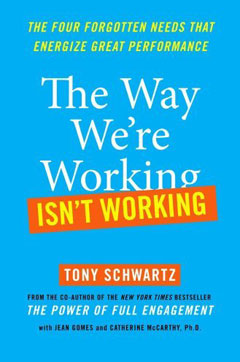
It’s difficult to summarize this wide-ranging book, but I can say that, as you might expect, part of the reason for bad feelings about work has to do with you and your attitude, and part of the reason comes from “the system.” There are some really simple things you can do to literally transform your working life into something good for you and good for your line of work also. If you struggle with these things, you simply must read this book.
Earlier this year, we were in Bratislava, the capital of Slovakia, for a few hours on a rainy afternoon, and while the food was good and the architecture in the central old city was beautiful,
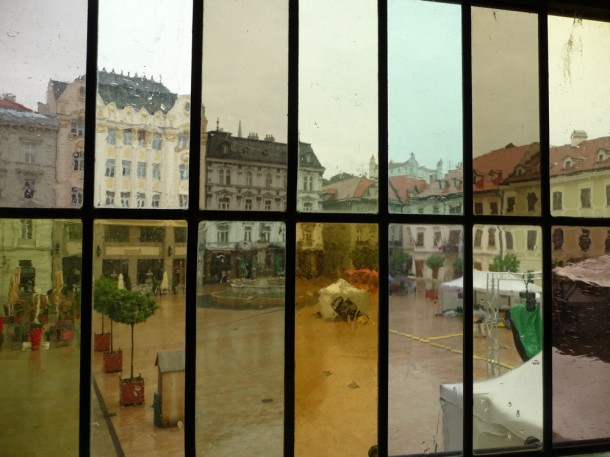
we were a little bit saddened by the conditions outside the old city walls. Crumbling buildings, sidewalks, and roads seemed rampant, and anything metal seemed completely rusted out.
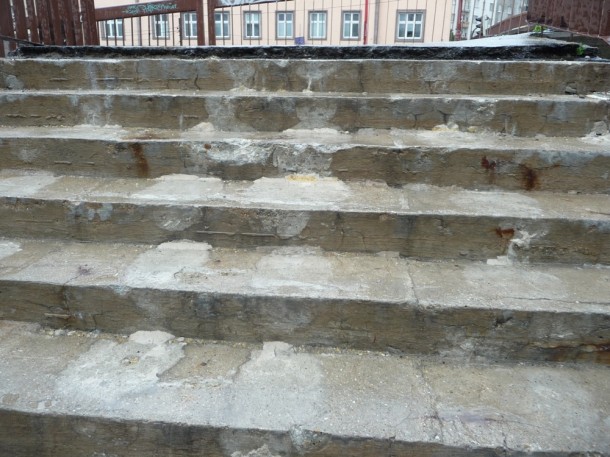
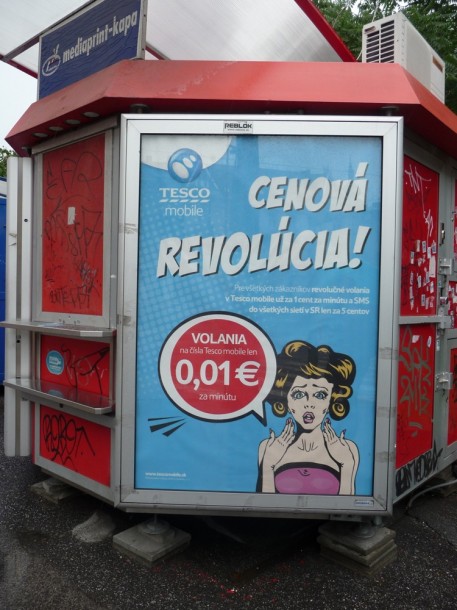
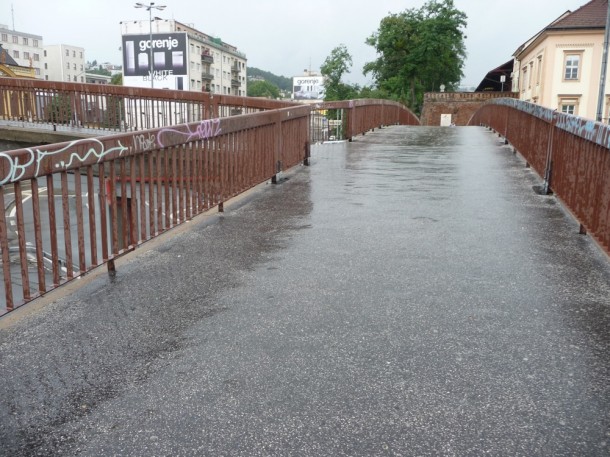
So my heart was strangely warmed by the story this week that Slovakia, a country that is significantly less affluent than probably any place else in Western Europe, temporarily refused to agree to fund its share of the latest round of Greek bailout money from the EU. See here, and here.
Not that I think the Greeks should not be bailed out in some form, but I guess I just pull for the underdog in this situation, and Slovakia definitely appears to fit this role within the EU. Of course, the downside of refusing to agree to the bailout is that the entire Slovakian parliament has now been dissolved. This happened because the ruling party thought a yes vote was so important that they tied their political future to a majority of yes votes. When they didn’t get enough votes, the ruling coalition fell apart and elections were moved up from 2014 to March of 2012.
This sounds extreme, but it seems somewhat exemplary for our landlocked, deadlocked, accomplishment-blocked House and Senate here in the U.S. If a failure to make a decision were tied to an immediate dissolution of Congress, it seems like maybe they would get a lot more decisions made, which I think would be a good thing. (cf Debt Ceiling “Crisis”, etc…)
2008 (the beginning)
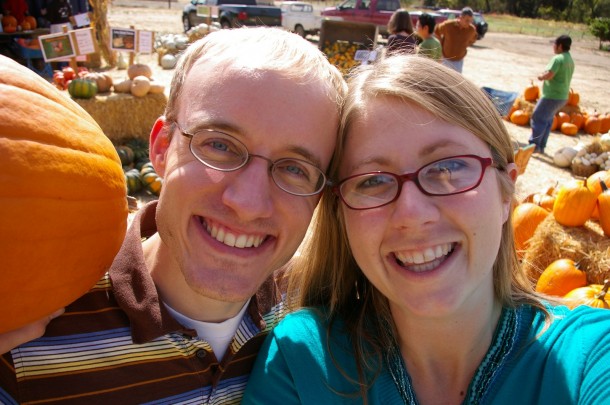
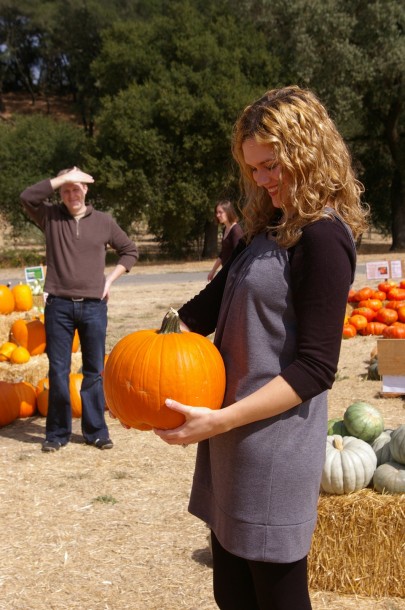
2009 (+2)
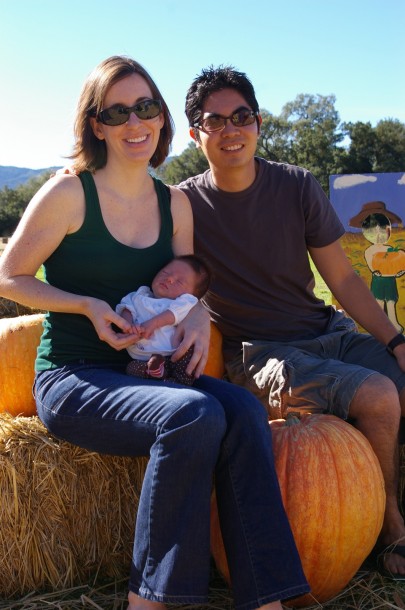


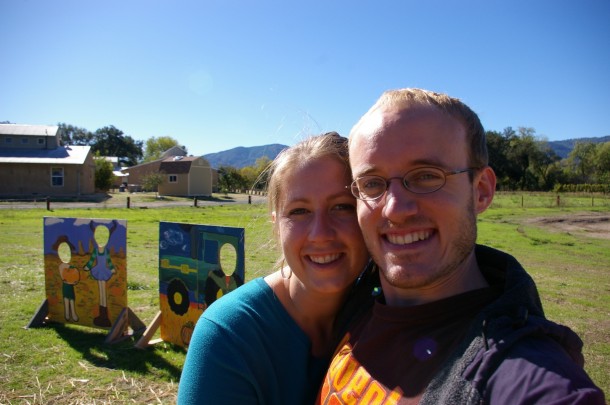
2010 (almost rained out, but not quite)

2011 (round four)

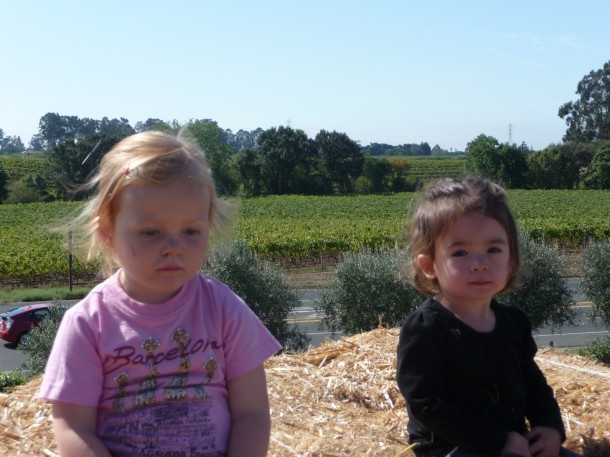
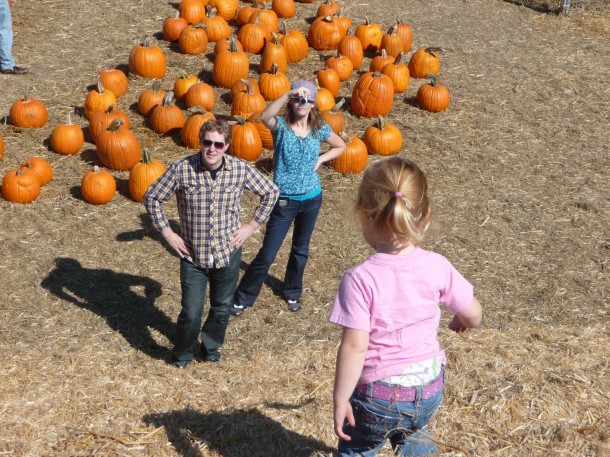
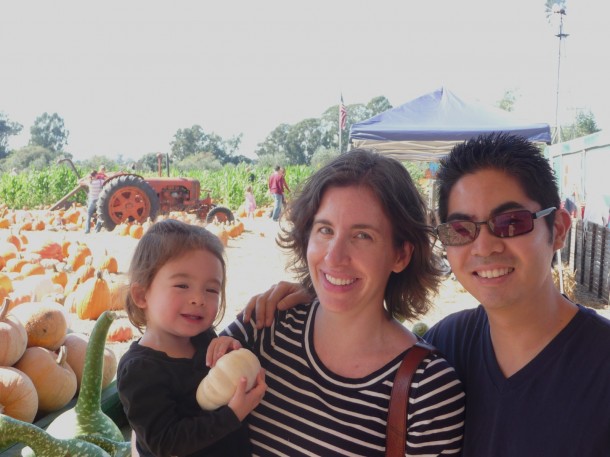
From the latest Google newsletter, Think Quarterly, comes this brilliant excerpt from an article about Richard Branson, CEO of, well, many things:
Plenty of billionaires tout humble roots involving lemonade stands and assembly-line factory jobs, but few are as adamant as Branson that all their employees know what it’s like to be part of a small operation up against far bigger competitors. At Virgin Records, he’d even split up employees’ physical workspaces as the company grew in order to maintain an underdog atmosphere.
“As the record company got bigger, when it had more than 100 people in a building, I’d go in and ask to see the deputy managing director, the deputy sales manager, the deputy marketing manager, and I’d say, ‘You’re now the marketing manager, the sales manager, of a new company,’ and we would then find a new building, set up a brand new company, and we kept on replicating this,” Branson explains. “We had about 25 different record companies in 25 different buildings, rather than one massive group of people in one building. It seemed to work, and so as much as possible we continued to try to do that. I think if you’ve got more than 150 people, it’s very difficult for a chief executive to know everybody and for everybody to know each other well.”
I would love to see this happen in my office of 330 – divide everyone up into 3 or 4 teams and make sure everybody knows everybody and stays connected to each other and to the mission.
Another day biking the Danube! The main attraction on this day was Melk, a town which is purportedly one of the first places to be referred to as an “Austrian” place, and home of the nearly 1,000-year-old Melk Abbey. My notes in my journal call this place “outlandishly huge and ostentatious”, but I’ll let the pictures do the talking.
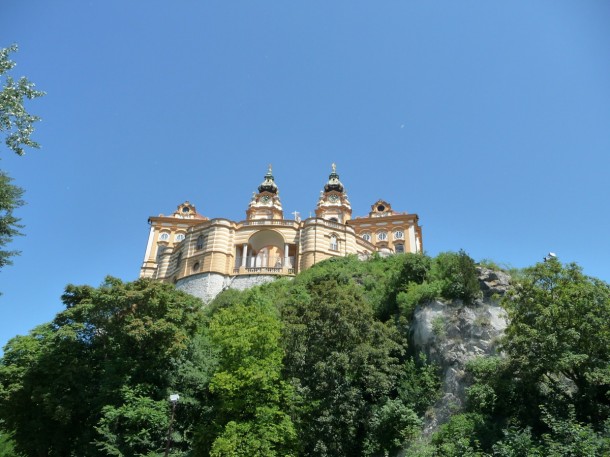
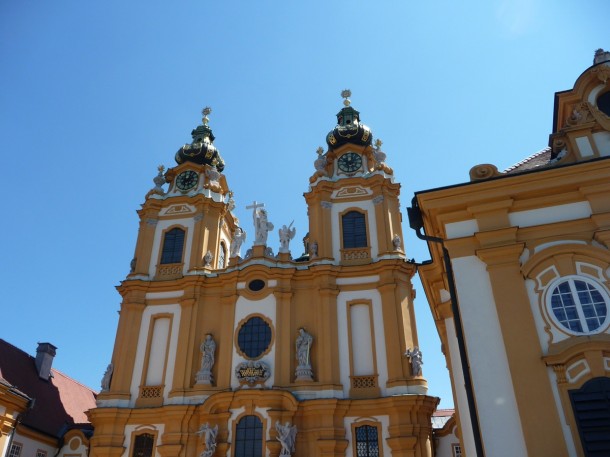
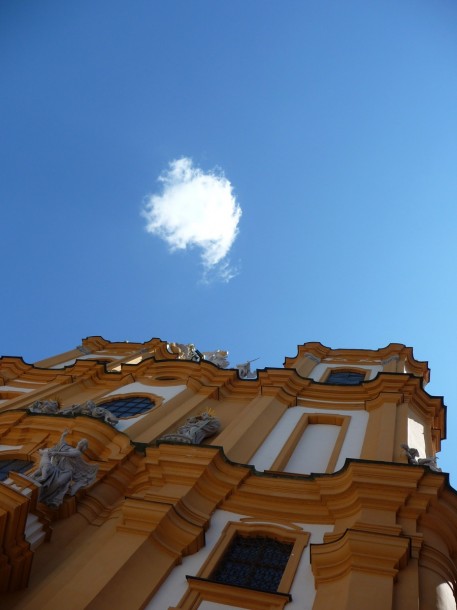
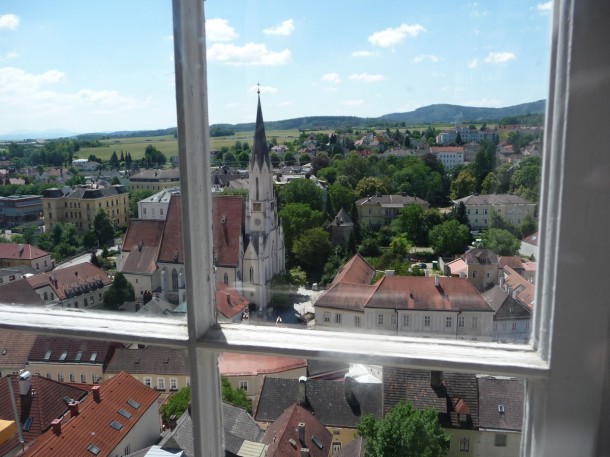
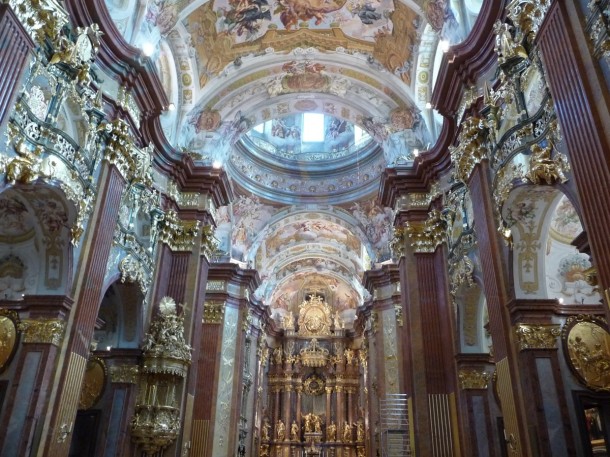
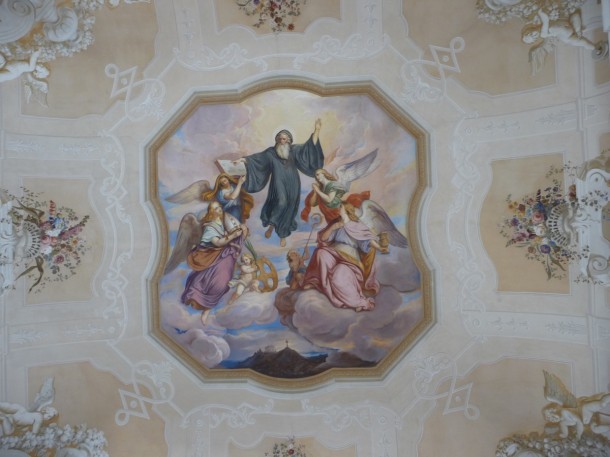
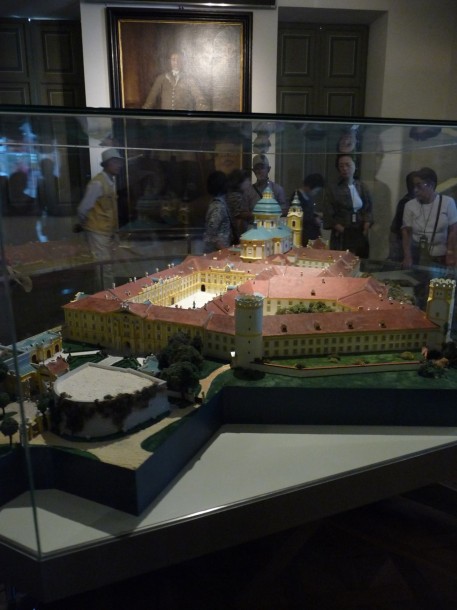
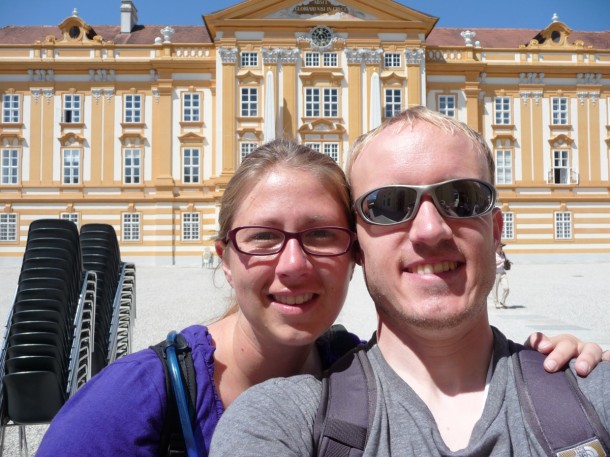
Picking up where my last blog left off in the town of Enns…we left the next morning to this sign:
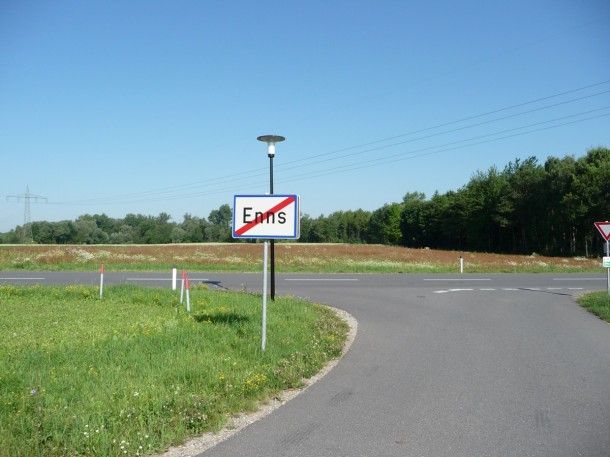
I love seeing signs in other countries. I think they really reveal something about the way of thinking of a culture. Or maybe the sign designs are just the result of a peer-reviewed study commissioned by a technical committee. Either way, I still like this sign for the simplicity of the red diagonal line.
Our biking distance on this day was 85 km, our longest day, mostly because we decided to backtrack a few miles to visit Mauthausen. Even now, more than two months away from seeing this place, I’m not sure how to express how visiting this concentration camp made me feel. It was a terrible place, and I am still trying to figure out how such a place could ever even come to exist. Oppression, slavery, human trafficking, call it what you will, but the evidence from this camp is incontrovertible that these things are wrong. I don’t have a reasoned philosophical argument behind this; just an experience that left me with a feeling I know to be true.
I couldn’t take very many photos there, but I did get this one, of the memorial to Italian political prisoners who did not survive their time at this camp:
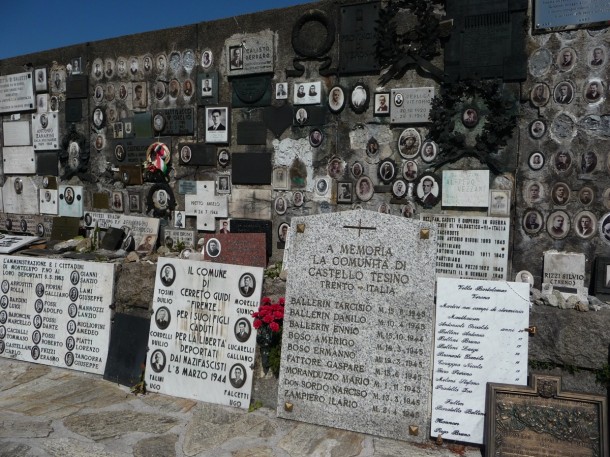
Many different nationalities had memorials at this camp, but only the Italians had somehow come up with portraits of almost every one of their victims. I’ve been to some old-school Italian restaurants where the walls are covered with portraits also…must be a cultural values thing.
Anyway, on to happier topics, like more road signs, this one proving that we were awesome bikers for dragging ourselves up a 14% grade:
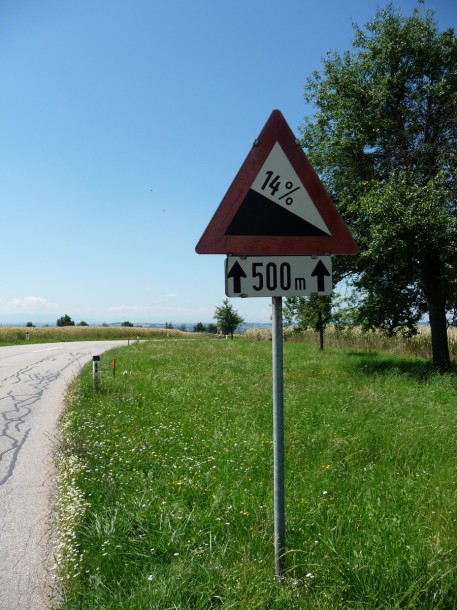
Later in the day we were detoured off the river for many miles due a washout on the path, and we came across some huge levy/floodwall construction, including this gate separating a small town from the destruction that the spring Danube can bring:
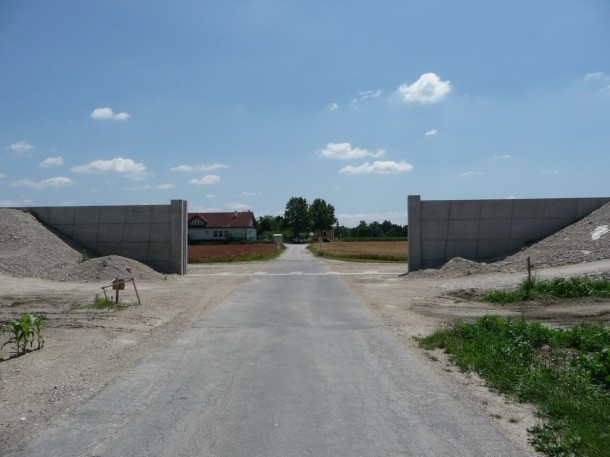
Just before we reached our destination, a riverfront hotel in Marbach an der Donau, we passed through more of the seemingly endless farmland in Austria. It was a welcome sight to see so much rejuvenation and life.
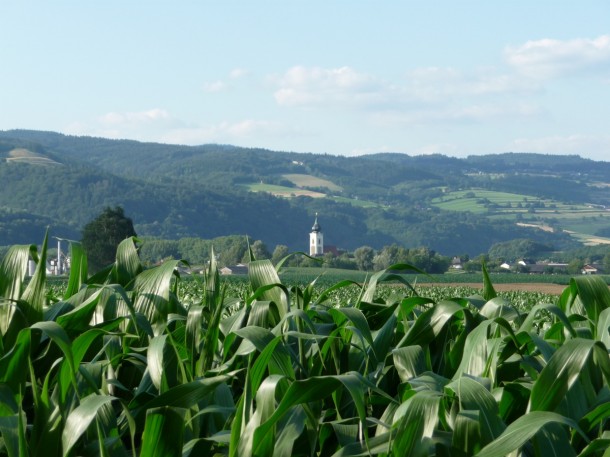
Traveling is awesome in large part due to unexpected events, and since I’m the kind of person who spends a lot of time planning and researching and in general attempting to eliminate the unexpected, I like to think that traveling is healthy, even therapeutic, for me. This is a line of thinking that can only be pursued after the fact though, because finding out on day 2 of your 6 day bike trip that late June in Upper Austria contains more than a slight possibility of rain is anything but therapeutic.
The upside of a quasi-rainy day on a bike trip, however, is that you don’t have to worry about getting too hot. Another larger and more important upside of summer rain is that edible crops grow! Our second day biking took us out of the mountains and into farmland, some of the most beautiful farmland I’ve ever seen:
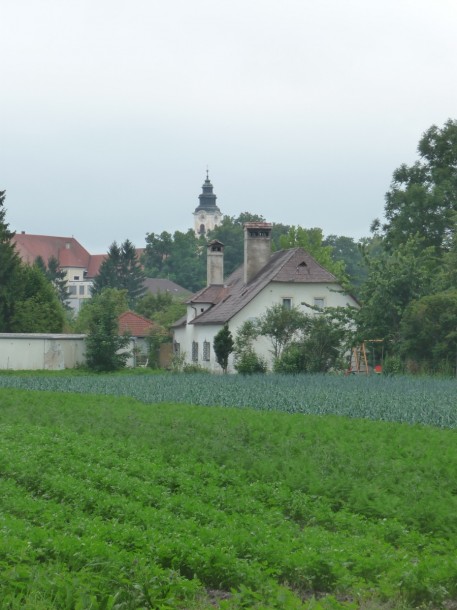
But before you write Upper Austria off as a place filled with quaint farming villages (which it is), consider these people, taking an assumably epic Segway tour of the city of Linz:
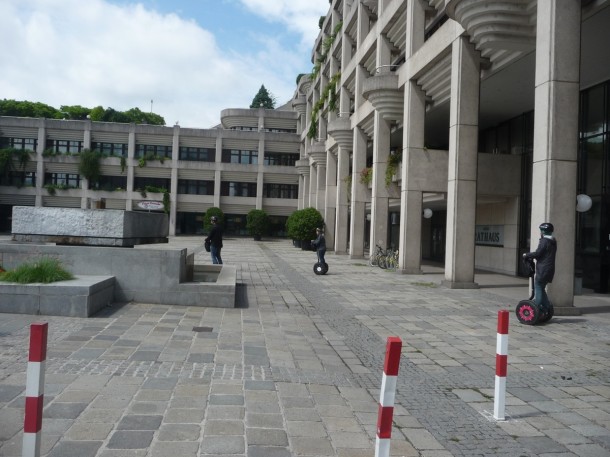
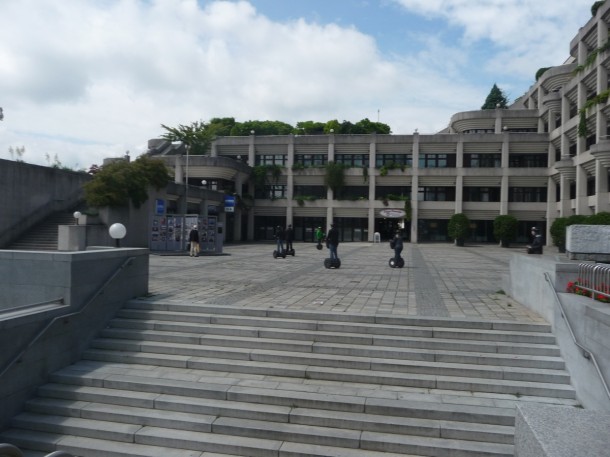
I wonder if they made it over to see the “martin luther church”
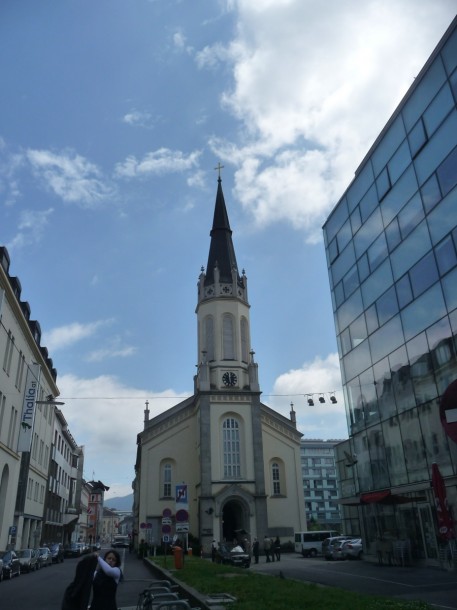
which was about 1/20 the size of (and about 20 times more charming than) the neighboring catholic church. Growing up in the pacific northwest, I tend to root for the underdog, which may explain why I was drawn to this little protestant church in a heavily catholic region. Or maybe I just liked it for its simplicity.
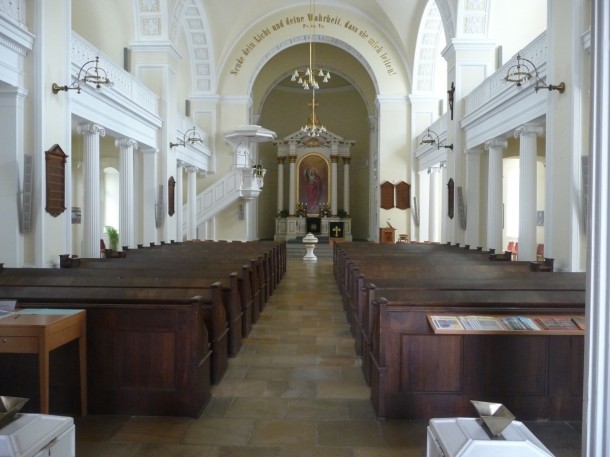
Not everything in Linz was quite so serene…an outdoor concert of “classic music” the night before meant that our conversation over lunch in the main square was had in conjunction with a construction crew with heavy machinery noisily taking down the stands and stage. Still, the food (and company) was excellent:
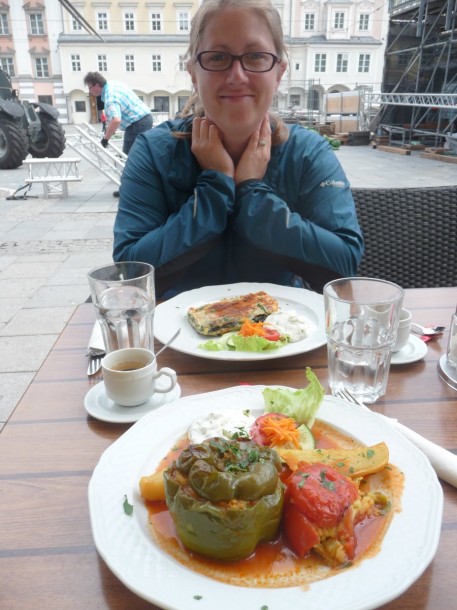
Before leaving Linz, we crossed the river and took a newly-rebuilt tram to Postlingberg, climbing 255m at an average 6% grade in less than 20 minutes. The track gauge has recently been adjusted from 1m to 0.9m, and that meant new cars, which meant new instructive signage. I especially like the guy on the far right.
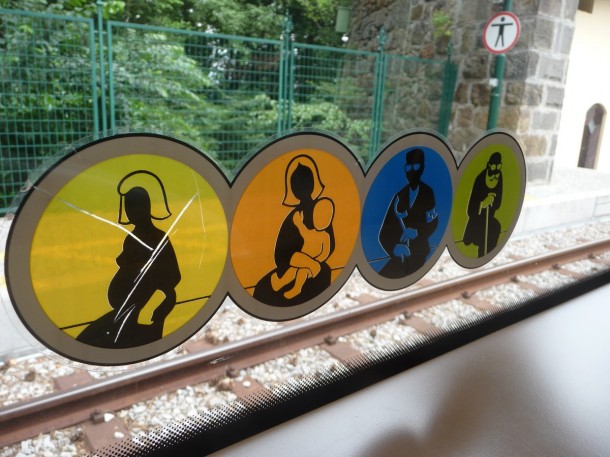
The rest of the day involved biking and eating and getting passed by small-ish pelotons (which I think is probably more fun than trying to keep up with them).
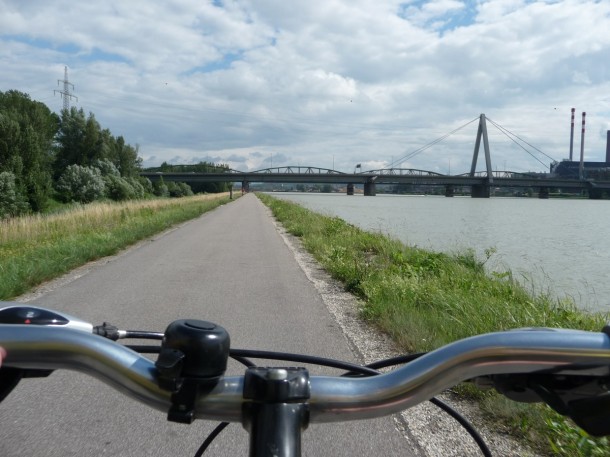
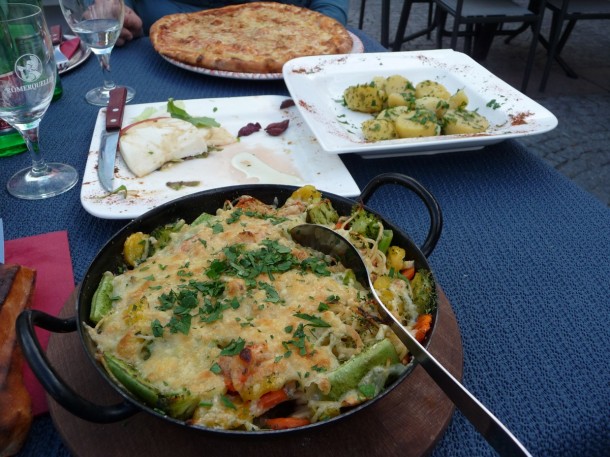
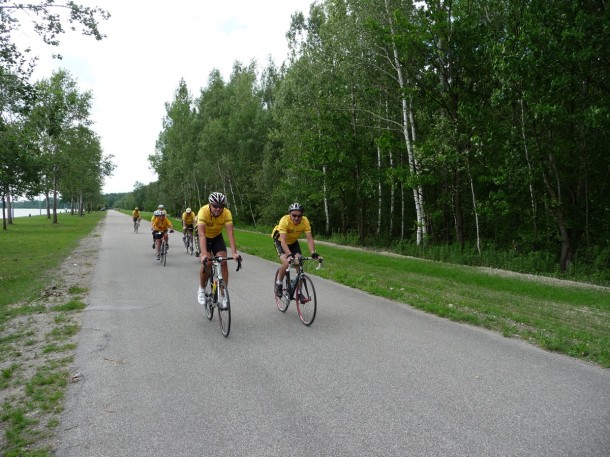
It was hard to say goodbye to Munich after just a couple days, but we had to, so we did. Our real train trip of the vacation took us to Salzburg, traveling 90 miles at about 90 mph most of the way!
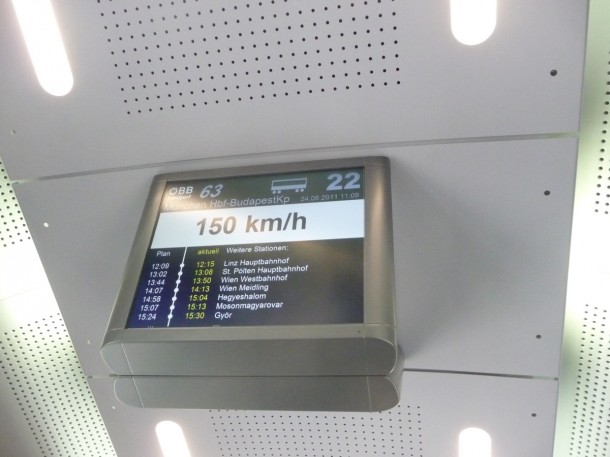
Upon arriving in the legendary burg, this was one of the first signs I saw.
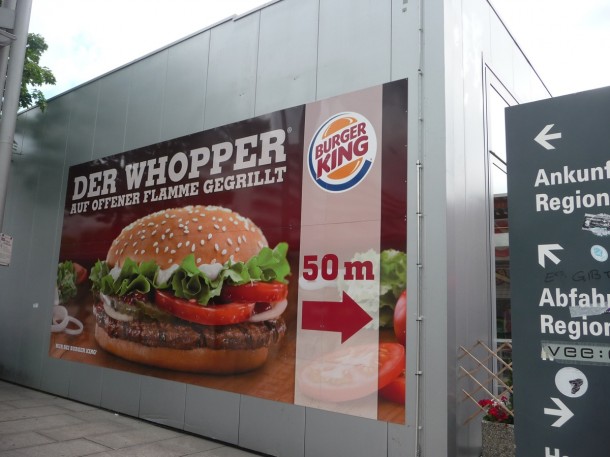
Der whopper indeed. I took this as a sign that better sights could be found away from the train station, and we headed into the center of Salzburg. After walking through the house (built in the 12th century) where Mozart was born (in the 18th century), which is now more of a museum encompassing the entire family (countless plaques lauded the accomplishments of W.A. Mozart’s son, oddly), we headed toward the Hohensalzburg Castle, which lurks directly above the old town. Far above it. Upon seeing the price of the funicular ride to the top, we elected to save our euros (or so we thought) and just walk up. The climb was really quite pleasant, except for the hundreds of stairs alternating only with a steep pathway.
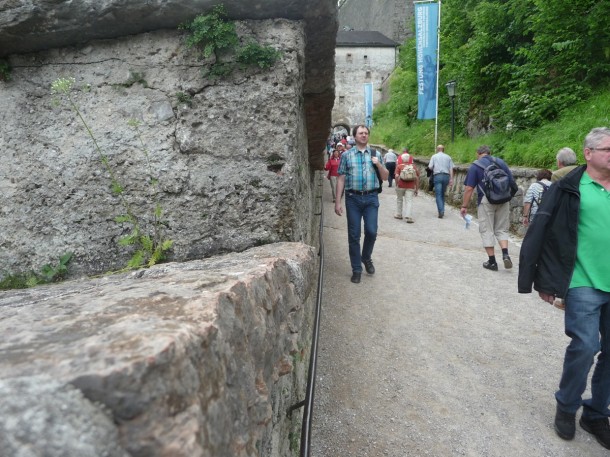
Nevertheless, we gallantly pressed on, only to encounter about 2/3 of the way up the hill a faregate which extracted almost as many euros from us to enter the castle as we would have paid to get a ride to the top and enter. Hmmm. Luckily, we could fall back on our pride in climbing the hill under our own power to restore the mood, which is exactly what we did. And the view pretty much took us the rest of the way to a great day.
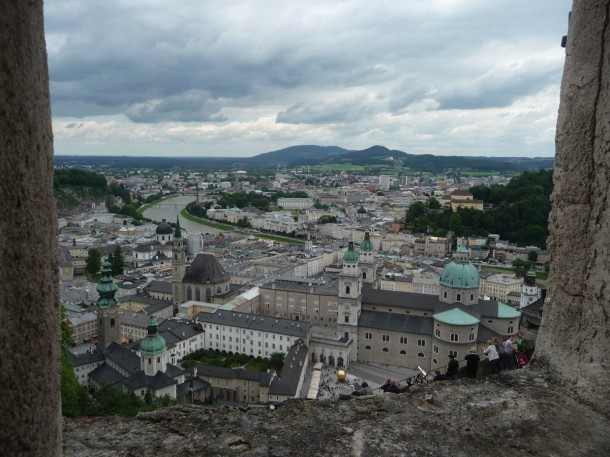
One last thing I’d like to point out before leaving Salzburg is that not only are their trains on time and frequent, even their bus stops have detailed real-time arrival info for every line.
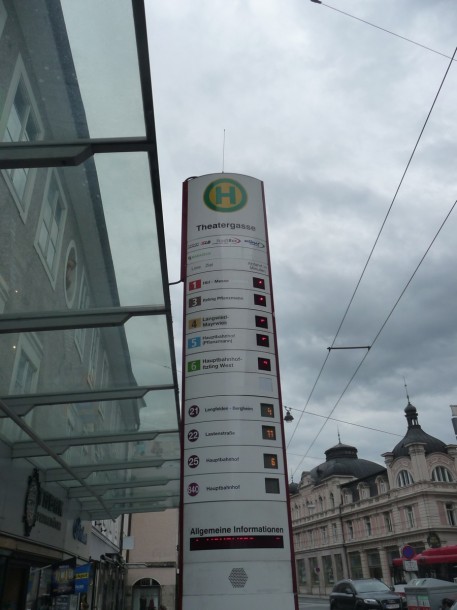
Have you ever waited at a bus stop in the US? That had this kind of info? Me neither.
By the end of the day, we needed to be back in Germany, which meant a couple more trains, one of which was packed full, seats and aisles, and which we very nearly missed exiting at our transfer point because we had to get ourselves and our lugguage from the center of the car to the end, stepping around, over, or through one person at a time. Somehow, we got out just in time, and made it to this town!
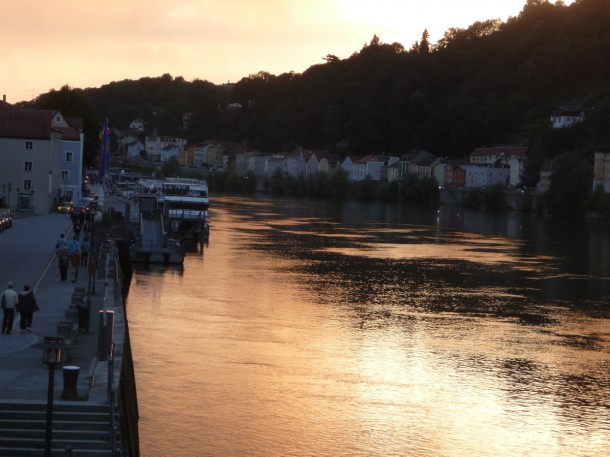
Passau is at the confluence of three rivers (all of which appeared to be very near flood stage when we were there), but the river in this photo is the Donau (Danube), along which we would be biking for the next six days. As any good biker knows, the most important part of any bike trip is preparation, and by preparation I mean eating!
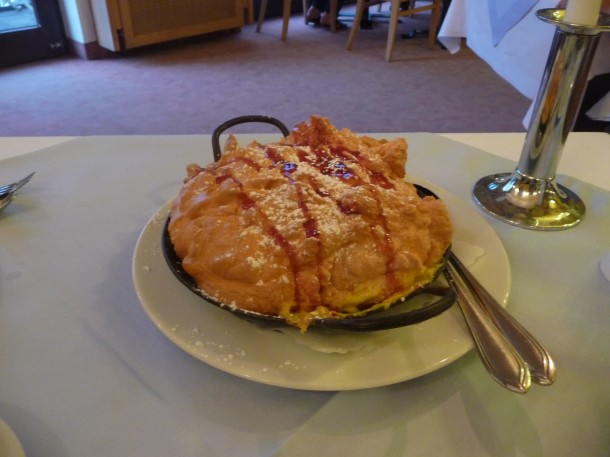
We managed to score this delicacy (nockerl) in our hotel restaurant, and it definitely hit the spot. The next morning, we started riding the Donauradweg (Danube Bike Way) with the following route to accomplish by the end of the day:
The path start out looking like this:
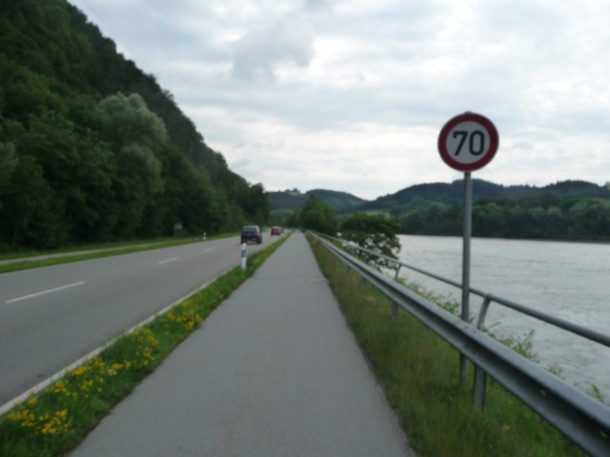
and at various points along the way you can cross the river on bike ferries like this:
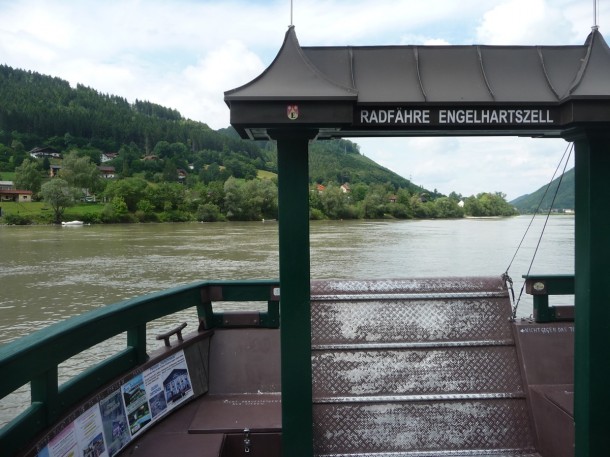
climb a couple hundred meters (optional side trip) to castles like this: (only to find that the castle is both privately owned and in disrepair, but that’s ok, because you really just wanted to climb a mountain for the sense of accomplishment. again.)
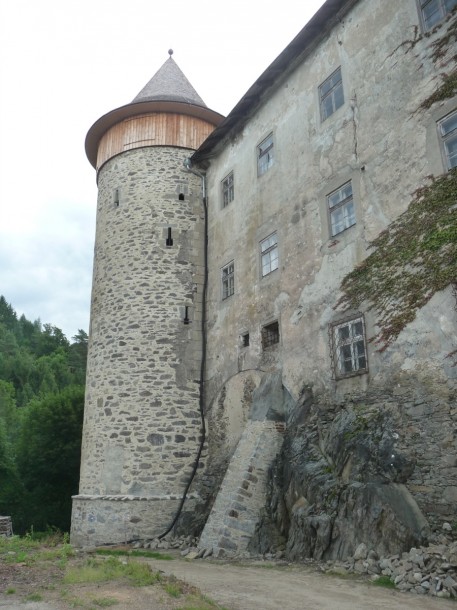
and pass by residences like this:
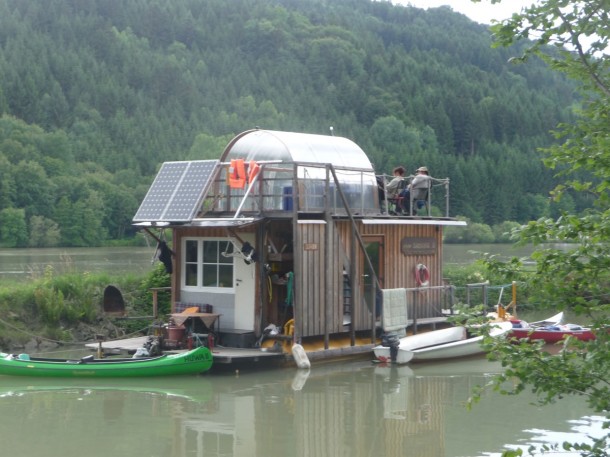
all of which makes you very hungry, so by the time you complete the 48 mile ride to the next hotel and stagger into the only restaurant in town which is open, you end up somehow convincing your waitress, through her broken english and your nonexistent german, to read back your order as “everything on the menu, except meat”.
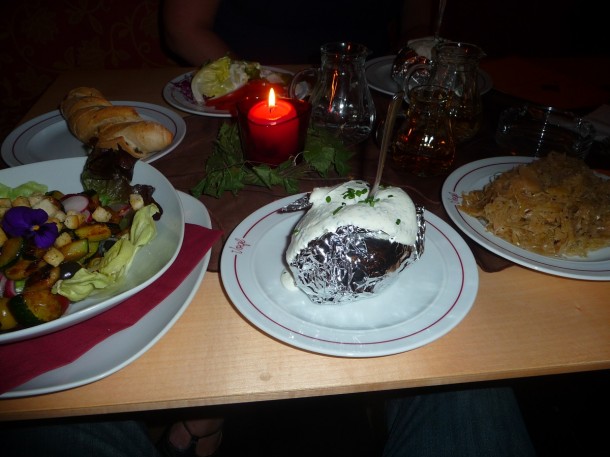
Yes, exactly.
|
|


















































